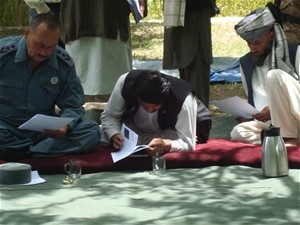
Attendees of the Loya Jirga in Kahmard District in Bamyan Province examining the proposal for a 164 kilometer road that is planned to bring development and jobs to the towns and villages along the route.
USAID/AIRP
USAID works with local stakeholders to provide safety for projects.
11 OCTOBER 2010 | KAHMARD DISTRICT, BAMYAN PROVINCE, AFGHANISTAN
The shoes were the first indication. Tan lace-up boots, black rubber sandals, backless slippers, and penny loafers lined the blue canvas tarmac where almost 300 assembled. The people were gathered to address the violence that threatens a 164-kilometer road that USAID funds.
The loya jirga (grand assembly) took place on a summer day underneath the fruit trees of an orchard in Kahmard District, midway between Bamyan and Dushi cities, the end points of the road which promises new economic development and jobs. Listeners sat on the ground against earthen berms as oversized road maps strung from low branches fluttered in the breeze.
Representatives of the local Provincial Reconstruction Team and the Afghanistan Infrastructure Rehabilitation Program described recent shootings and roadside IED activity in the area. “By being here,” the PRT commander said, “you have shown yourselves to be true leaders of your people. We need your help.”
District governors, local businessmen, village elders, and religious leaders rose to address the crowd. Some spoke for a few minutes. Others gestured with their hands, their voices rising and falling with emotion. Elderly leaders propped themselves on canes and held the microphone close to their beards. In the audience, turbaned heads leaned into each other, softly murmuring. “The Taliban are not part of our community,” said the mullah, respected for 30 years for counseling his people at Friday prayer. “Whatever we can do to support the road,” the district governors promised, “we will do.”
The orchard owner was clear. An improved road would bring medical care so that he would not have to send his daughter to a faraway hospital. “I was not allowed to see her,” he said. “I wanted to be with her.”
When the speeches were over, and everyone had eaten from large metal pots of rice and chicken, participants drifted into small groups—soldiers and governors, villagers and community officers, policemen, and masonry workers. The sky became overcast and people retrieved their different footwear. Together, they wound their way to the dirt road that, if the meeting proves successful, will one day bring the prosperity and services they and USAID desire.







Comment
Make a general inquiry or suggest an improvement.